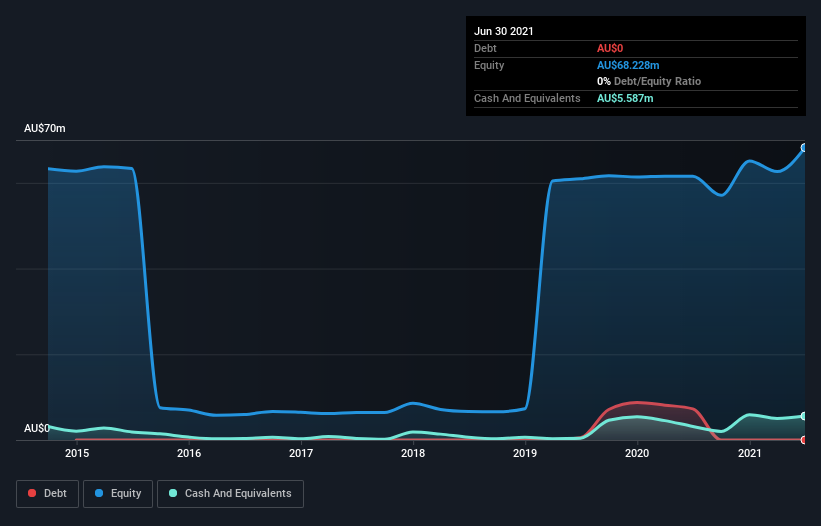- Canada
- /
- Metals and Mining
- /
- TSXV:MMS
We're Not Very Worried About Macarthur Minerals' (CVE:MMS) Cash Burn Rate
There's no doubt that money can be made by owning shares of unprofitable businesses. For example, biotech and mining exploration companies often lose money for years before finding success with a new treatment or mineral discovery. Having said that, unprofitable companies are risky because they could potentially burn through all their cash and become distressed.
So, the natural question for Macarthur Minerals (CVE:MMS) shareholders is whether they should be concerned by its rate of cash burn. For the purposes of this article, cash burn is the annual rate at which an unprofitable company spends cash to fund its growth; its negative free cash flow. We'll start by comparing its cash burn with its cash reserves in order to calculate its cash runway.
See our latest analysis for Macarthur Minerals
When Might Macarthur Minerals Run Out Of Money?
A company's cash runway is the amount of time it would take to burn through its cash reserves at its current cash burn rate. In June 2021, Macarthur Minerals had AU$5.6m in cash, and was debt-free. In the last year, its cash burn was AU$3.9m. That means it had a cash runway of around 17 months as of June 2021. That's not too bad, but it's fair to say the end of the cash runway is in sight, unless cash burn reduces drastically. Depicted below, you can see how its cash holdings have changed over time.

How Is Macarthur Minerals' Cash Burn Changing Over Time?
Because Macarthur Minerals isn't currently generating revenue, we consider it an early-stage business. Nonetheless, we can still examine its cash burn trajectory as part of our assessment of its cash burn situation. While it hardly paints a picture of imminent growth, the fact that it has reduced its cash burn by 46% over the last year suggests some degree of prudence. Admittedly, we're a bit cautious of Macarthur Minerals due to its lack of significant operating revenues. So we'd generally prefer stocks from this list of stocks that have analysts forecasting growth.
Can Macarthur Minerals Raise More Cash Easily?
Even though it has reduced its cash burn recently, shareholders should still consider how easy it would be for Macarthur Minerals to raise more cash in the future. Generally speaking, a listed business can raise new cash through issuing shares or taking on debt. One of the main advantages held by publicly listed companies is that they can sell shares to investors to raise cash and fund growth. By looking at a company's cash burn relative to its market capitalisation, we gain insight on how much shareholders would be diluted if the company needed to raise enough cash to cover another year's cash burn.
Macarthur Minerals has a market capitalisation of AU$69m and burnt through AU$3.9m last year, which is 5.6% of the company's market value. That's a low proportion, so we figure the company would be able to raise more cash to fund growth, with a little dilution, or even to simply borrow some money.
So, Should We Worry About Macarthur Minerals' Cash Burn?
Macarthur Minerals appears to be in pretty good health when it comes to its cash burn situation. One the one hand we have its solid cash burn reduction, while on the other it can also boast very strong cash burn relative to its market cap. Based on the factors mentioned in this article, we think its cash burn situation warrants some attention from shareholders, but we don't think they should be worried. Taking a deeper dive, we've spotted 4 warning signs for Macarthur Minerals you should be aware of, and 1 of them makes us a bit uncomfortable.
Of course, you might find a fantastic investment by looking elsewhere. So take a peek at this free list of interesting companies, and this list of stocks growth stocks (according to analyst forecasts)
New: Manage All Your Stock Portfolios in One Place
We've created the ultimate portfolio companion for stock investors, and it's free.
• Connect an unlimited number of Portfolios and see your total in one currency
• Be alerted to new Warning Signs or Risks via email or mobile
• Track the Fair Value of your stocks
This article by Simply Wall St is general in nature. We provide commentary based on historical data and analyst forecasts only using an unbiased methodology and our articles are not intended to be financial advice. It does not constitute a recommendation to buy or sell any stock, and does not take account of your objectives, or your financial situation. We aim to bring you long-term focused analysis driven by fundamental data. Note that our analysis may not factor in the latest price-sensitive company announcements or qualitative material. Simply Wall St has no position in any stocks mentioned.
Have feedback on this article? Concerned about the content? Get in touch with us directly. Alternatively, email editorial-team (at) simplywallst.com.
About TSXV:MMS
Macarthur Minerals
Engages in the exploration and evaluation of mineral resource properties in Australia and the United States.
Medium-low with mediocre balance sheet.
Market Insights
Community Narratives



